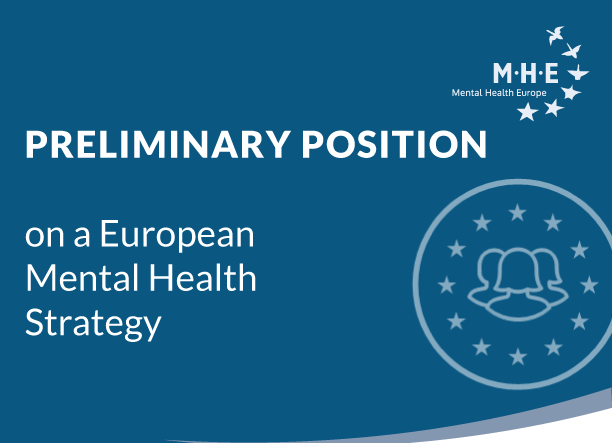European Mental Health Strategy: preliminary position

Ahead of EPSCO Ministers’ debate on the future of mental health policy on 09 December 2019, Mental Health Europe (MHE) has prepared its preliminary position on how a European Mental Health Strategy should look like and which topics include. The position can be used by stakeholders, particularly the EU institutions and the Member States, as a working document and baseline for the initial discussions on how to invest in mental health as a key component of the economy of well-being.
On Monday, 9 December, Health Ministers from all the Member States of the European Union (EU) will meet in Brussels for the Employment, Social Policy, Health and Consumer Affairs Council. One of the items in their agenda will be a debate on “Economy of Wellbeing – next steps in investing in health as its key component”, following the adoption of the Council Conclusions on the Economy of Well-being. During this debate, Health Ministers will also discuss the state of mental health in Europe and the need for a comprehensive, cross-sectoral EU strategy on mental health.
People’s well-being is not only a value in itself; it is a principle at the heart of the European project, as enshrined by Article 3 of the Treaty on the European Union. Mental health and well-being have also an impact on inclusion, growth and sustainability. It should, therefore, be considered and addressed throughout the policy-making process at the European and national levels.
Building on nearly 35 years of action in the European arena, MHE has identified the following key elements to be included in a European Mental Health Strategy, all adequate to the needs, coherent with the purposes and strong for an effective impact:
Psychosocial approach to mental health
Completing the transition from the biomedical model to the psychosocial model of mental health in Europe should be the overarching objective of the European Mental Health Strategy. The psychosocial model of mental health should, therefore, be used as the guiding, general principle to inform the Strategy and it should be mainstreamed throughout;
Meaningful (ex)users’ involvement
Mental health service users and persons with lived experiences should be meaningfully consulted throughout the design, implementation, monitoring and evaluation of the European Mental Health Strategy;
Mental health in all policies
The Strategy should foresee the inclusion of mental health in all policies, as well as consider the impacts of different policies on mental health and address the socio-economic determinants of mental health;
Concrete objectives and resources
To bring meaningful changes, the Strategy should have comprehensive objectives with clear benchmarks and indicators, as well as an adequate budget allocated for its implementation. A coordinating mechanism should be put in place to implement and monitor the Strategy with all EU institutions and its Member States;
Coherence with other policy tools and commitments
The new Strategy should integrate and create synergies with existing policy, legislative and governance frameworks (e.g. the European Semester, the European Pillar of Social Rights, the Sustainable Development Goals, etc.) as well as be in line with existing human rights commitment (e.g. United Nations Convention on the Rights of Persons with Disabilities).
***
Further reading
- MHE response to the Council conclusions on the Economy of Well-being (October 2019);
- MHE reflection paper on the Sustainable Development Goals (September 2019);
- MHE assessment of the European Disability Strategy 2010-2020 (April 2019);
- MHE Manifesto for the 2019 European Parliament Elections (December 2018);
- MHE-EUFAMI Joint-statement on mental health for the EU Health Policy Platform (February 2017);
- MHE position on the EC Green Paper on Mental Health (2006).
Stay connected
Get our latest news, personal stories, research articles, and job opportunities.